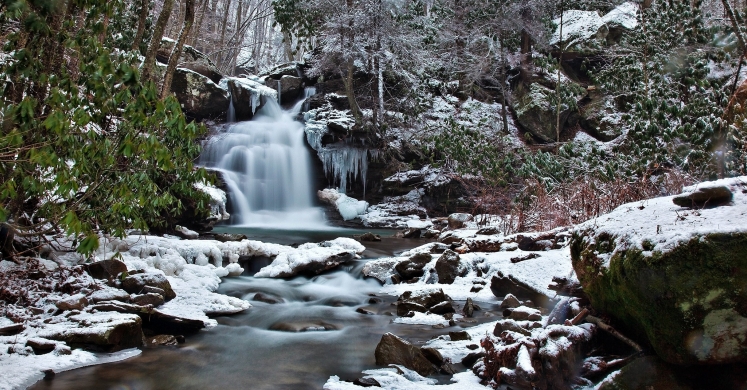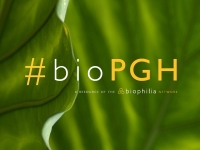Blog

#bioPGH Blog: All in a Day’s Ecosystem Service!
 A resource of Biophilia: Pittsburgh, #bioPGH is a weekly blog and social media series that aims to encourage both children and adults to reconnect with nature and enjoy what each of our distinctive seasons has to offer.
A resource of Biophilia: Pittsburgh, #bioPGH is a weekly blog and social media series that aims to encourage both children and adults to reconnect with nature and enjoy what each of our distinctive seasons has to offer.
The weather may have warmed up this week, but when we were still blanketed in snow over the weekend, did you have a chance to enjoy the beautiful outdoors and go sledding? Or maybe build a snowman, join in an epic snowball battle, or perhaps go skiing? If you did, you were able to enjoy what’s called an “ecosystem service”—a term that applies to the broad variety of ways that the Earth’s natural processes contribute to global economics, human well-being, and survival. Wait, wait, we might wonder, How does sledding fit into a concept that encompasses everything from our food supply to the global economy? Well, ecosystem services are generally broken up into four categories: regulating services, provisional services, supporting services, and cultural services. Let’s explore them!
Regulating services: This category includes all of the ways that natural processes are regulated on Earth. Examples of regulating services include such processes as water purification, flood and erosion control, carbon management, and decomposition of organic materials by animals, plants, fungi, invertebrates, and bacteria. All of these processes would be impossible for humans to manage completely on their own. Here in Allegheny County, a fascinating example of a regulating service at work is at Wingfield Pines, managed by the Allegheny Land Trust. A large land area formerly contaminated with abandoned mine drainage, Wingfield Pines utilizes a complex wetland system to purify the water.
Provisional services: Any sort of resource that is extracted from the land can be considered a provisional resource. For example, this includes our drinking water; and considering our bodies are ~70% water, we certainly need it! A less obvious provisional service is our source of medicines. Over half of modern pharmaceuticals were originally derived from plant materials, and research continues with compounds produced by a wide range of taxa, from algae to snails!
Supporting services: No matter where we are on the planet, there is a constant range of activity from all of the underlying biological and chemical processes that keep the Earth functioning like a brilliant machine made of a million cogs. These are our supporting services. This includes plant pollination, food production via photosynthesis, soil production, nutrient cycling, and the processing of naturally-occurring chemicals. It’s a tall order, but healthy ecosystems can get it done—how amazing is that?
Cultural services: Any time we go camping, fishing, hiking, snowboarding, trail running, exploring, or sledding (!) we enjoy the wonder of nature’s cultural services, which encompass our societal and cultural relationships to nature. The earth’s cultural services are a huge part of the global economy, which makes sense when we think about buying skis or fishing poles or kayaks—not to mention the related tourism! However, cultural services also include cultural significance—the relationships that different cultures and heritages share with nature. Many societies, both historic and modern, include elements of nature in spiritual or traditional practices.
If we combine all of these categories, scientists estimate that the annual value of our Earth’s natural processes are at least $145 trillion dollars. When we think about the values of the global food supply, the outdoor recreation industry and recreational lands and the pharmaceutical industry—it’s easy to see how the numbers add up. Combine that with breathable oxygen production, the carbon cycle and all of the tiny interconnected details of being a living being on Earth, and it’s nearly impossible to put a price tag on nature’s activities. We benefit from all of these ecosystem services every minute of every day, but the trick is to not take them for granted. We really do have an awesome planet, so let’s be sure we take care of it!
Connecting to the Outdoors Tip: As a fun family activity, make a field journal to document ecosystem services (but be sure to decorate that journal, those are the best!), and go for a walk in one of Pittsburgh’s parks. What kind of natural processes can you see happening, even in winter? Is there any water or snow on the ground? Where might that water be going, or where will it go when it melts? Will it have to travel through dirt or across roads? What about the trees around you--how do those trees help us while they have leaves? What happens to trees in the winter? Have fun with your questions and observations, and don't forget that questions are great things to go in a journal. Now, keep exploring!
Continue the Conversation: Share your nature discoveries with our community by posting to Twitter and Instagram with hashtag #bioPGH, and R.S.V.P. to attend our next Biophilia: Pittsburgh meeting.
Resources
National Wildlife Federation: Ecosystem Services
Nature: Biodiversity and Ecosystem Services - Is it the Same Below Ground?
Allegheny Land Trust: Wingfield Pines
Back to Nature: Extinction of Medicinal Plants Threatens Drug Discovery
Global Environmental Change: Changes in the global value of ecosystem services
The Outdoor Recreation Economy
Comparing NOAA’s Recreation and Commercial Fishing Economic Data
Select Photos © Vaido Otsar CC-BY-SA-3.0 and Forest Wander CC-BY-SA-3.0

